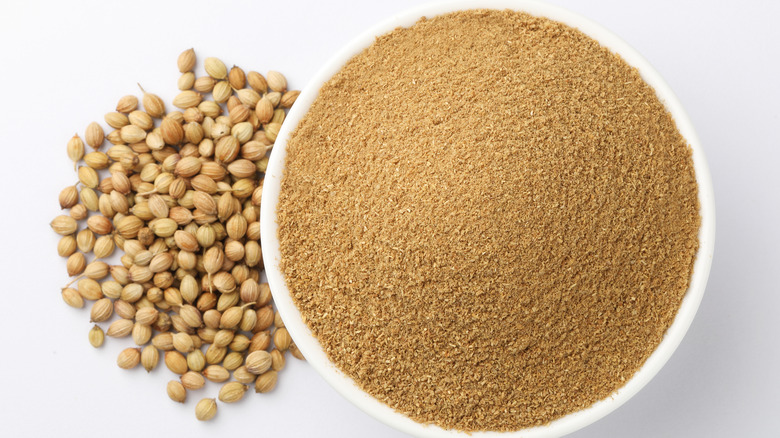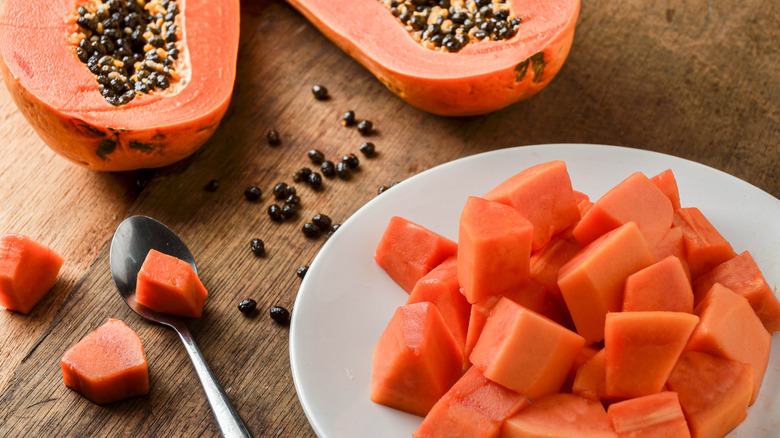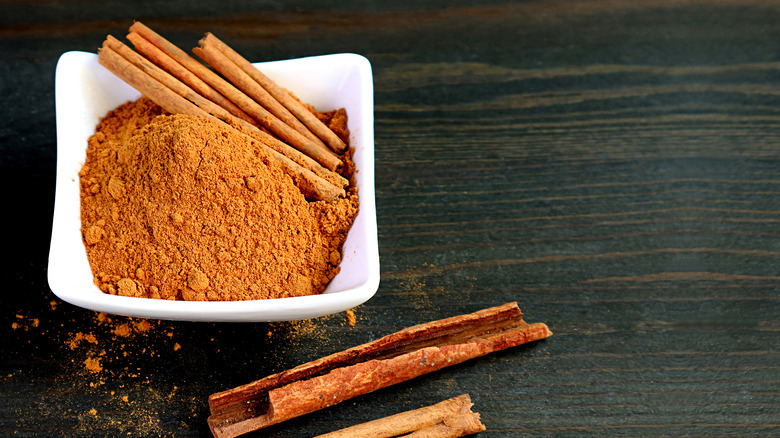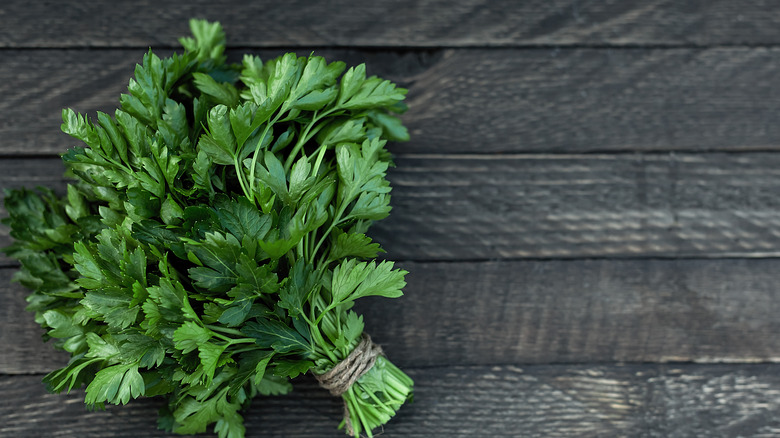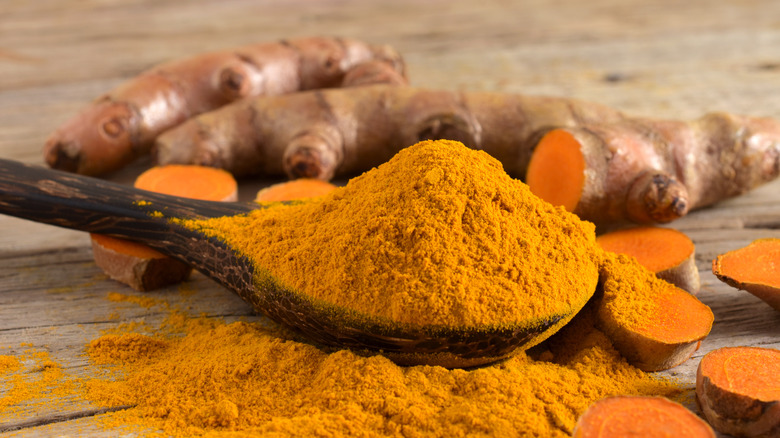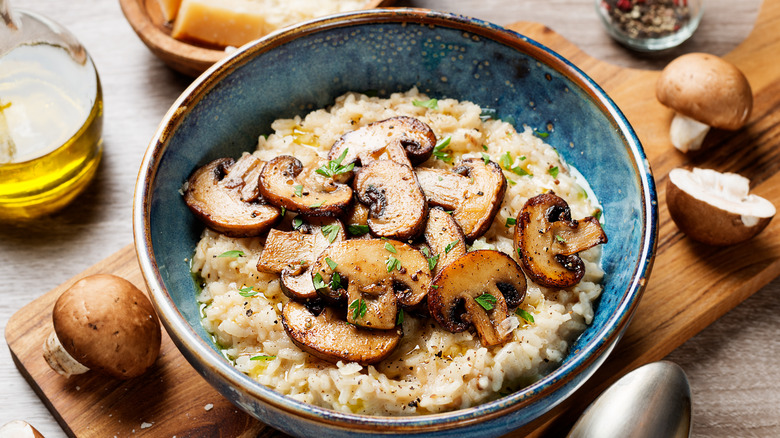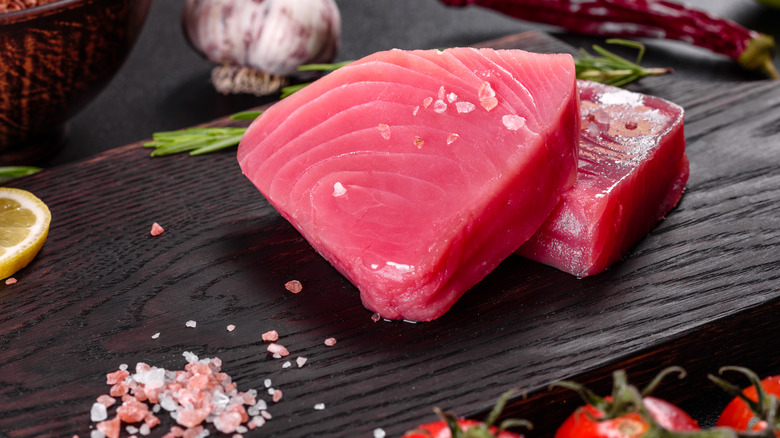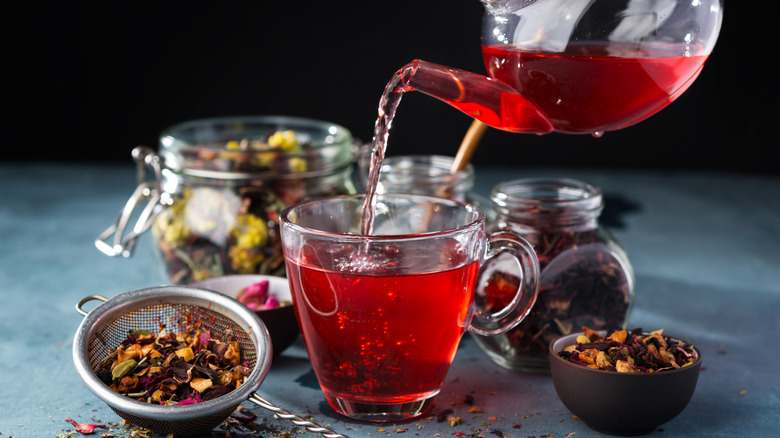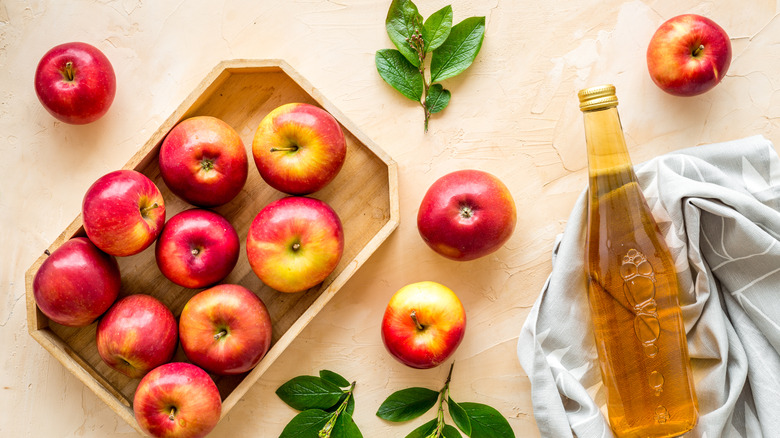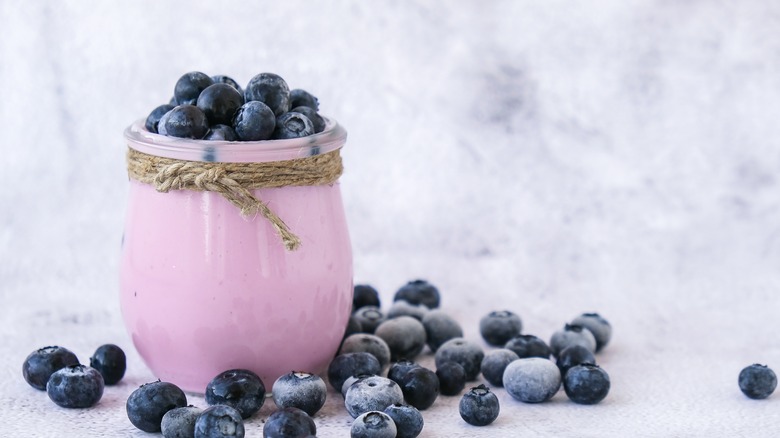If You Have An Irregular Period, These Foods Can Help You Out
You probably learned, way back in high school, that your period typically happens on a 28-day cycle. While there are exceptions (for instance, it's perfectly normal for your cycle to run between 21-45 days when you're a teenager and 21-35 days once you're an adult — via Verywell Health), the bottom line here is, you should expect to see your period make its appearance approximately once a month.
But what if that isn't the case? What if, while your friends are able to literally set their watch (or period app) around their cycle, you're unable to? What if you're currently trying to conceive, yet because your cycle is kind of all over the place, it's hard to know exactly when you're ovulating? When your period is irregular, what should you do?
The reality is, there are all kinds of underlying reasons for why some women have irregular periods. Medical News Today says it could be anything from being on birth control or other medication, hormonal fluctuations, over-exerting oneself while exercising, or even stress — the best way to know for sure is to speak with your physician. In the meantime, there are some things that you can do to help to get your cycle back on track — like consuming foods that have a reputation for regulating menstrual cycles, for instance. And so, here are 10 that just may help to make your period more predictable (again).
Coriander seeds can help to balance out your hormones
Coriander is an herb full of fiber, calcium, magnesium, iron and several other nutrients. According to Organic Facts, when you choose to consume the seeds on a fairly consistent basis, they can help to reduce bodily inflammation, bring relief to skin issues like eczema, lower cholesterol levels, aid in digestion, and even help to speed up the healing process if you have an ulcer.
What makes coriander such a winner (whether you have them in seeds or tea form) when it comes to regulating your period is the herb contains properties that will not only improve the quality of your uterus, but help to balance out your hormones better so that your period will become more predictable (via The Health Site). Dr. Axe sings the seeds' praises because they can reduce bloating and cramping during your time of the month too.
As far as where to find coriander seeds, they are usually available at your local health food store. If you're wondering just how to enjoy them, some people grind them and use them as a spice. Other people like to briefly warm them up in a skillet, add some salt, and snack on them whole.
Papaya can lower inflammation which can help to regulate your cycle
Papaya tastes kind of like a cross between a mango and a cantaloupe. If that sounds totally up your alley, treat yourself to one over the summer (when they're at their peak, per WebMD). According to Healthline, this fruit boasts lots of fiber and vitamin C, along with vitamin A, folate and potassium. All of these nutrients work together to reduce oxidative stress, fight off free radicals, improve digestion, protect your skin from damaging UV rays, and strengthen your heart.
The reason why you may want to consider making it a staple as far as your cycle is concerned is because there is more and more research that says irregular cycles and painful periods are oftentimes directly tied to an uptick in bodily inflammation. Papaya helps to lower inflammation which means that if you eat some, it could not only help to regulate your period, it could also make it less uncomfortable for you too.
Cinnamon brings relief to women with PCOS
Cinnamon is a spice that comes with all kinds of medicinal properties. According to Healthline, the antioxidants in it can fight off free radicals. Cinnamon also lowers blood sugar levels, reduces bodily inflammation, and can prevent bacterial and fungal infections. There's even some evidence that suggests it can help to fight the HIV virus. Some say that cinnamon serves as an aphrodisiac, too.
Cinnamon can also bring relief to women who deal with polycystic ovary syndrome (PCOS). In fact, cinnamon's ability to help restore regularity to periods has been studied. Also, if you happen to have side effects like nausea and/or vomiting during your cycle, cinnamon has a way of making those symptoms more bearable for you as well.
Sprinkling it on your food, sucking on a cinnamon stick, or drinking cinnamon tea all have ways of making your period more regular and easier to deal with.
Parsley contains properties that can help to induce uterine blood flow
While it might be hard to think of parsley being much more than garnish on some of your dishes, it actually can benefit your health on a variety of levels. Healthline states that it's filled with antioxidants that are potent enough to prevent DNA damage and cancer cells. Parsley is also great because it can help to prevent kidney stones from developing, it can stabilize your blood sugar levels, and it can strengthen your immunity.
Parsley makes the list of foods that can help to regulate your period because there are two properties in it, called as myristicin and apiol, that can increase the production of estrogen in your system, as noted by a study from BMC Complementary and Alternative Medicine. The same study notes that parsley is also known as an emmenagogue, which means that it's a food that can trigger period flow.
By the way, if you don't want to chew on parsley sprigs, go for some parsley tea. Adding honey, along with the warmth of the water, can soothe menstrual cramps in a delicious kind of way.
Turmeric is able to help decrease PMS symptoms
Do you happen to love Indian food? If so, you're probably really familiar with the spice turmeric. But do you know all of the ways that it's good for you? If you consume the kind that has the active ingredient curcumin in it, you will be getting anti-inflammatory properties into your system. You'll also be benefitting from a food that fights heart disease, treats diabetes, reduces depression-related symptoms, brings relief to eczema and psoriasis, and strengthens your vision (via Everyday Health).
As far as your period goes, turmeric can be helpful to you because it decreases symptoms that are associated with PMS and it can decrease excess estrogen production (which can also cause irregular cycles). The important thing to keep in mind here is turmeric is also considered to be a blood thinner (via Medical News Today). When it comes to your period, it could cause you to have an increase in blood flow, so you may want to speak with your doctor before consuming large amounts of it.
Inositol is a type of sugar that can help to regulate your period
Wondering what inositol even is? That's a pretty fair question. Long story short, it's a carbocyclic sugar that your body naturally produces and that you can get from certain kinds of foods. According to Verywell Health, the list includes citrus fruit, brown rice, and even sesame seeds. Inositol can be beneficial for you because it can help to relieve anxiety, reduce depression-related symptoms, and even decrease symptoms that are directly related to polycystic ovary syndrome (PCOS).
Consuming foods that are high in inositol can be good for your period because science has discovered that it can regulate menstrual cycles. Another bonus is it can improve ovulation in some women. So, if you'd like to give inositol a shot, Livestrong shares some other foods that contain the substance, like bananas, beans, raisins, peas and cabbage. Sounds like a pretty appetizing way to make your period come on time more often.
Foods high in vitamin D can regulate your cycle and increase your fertility
Some signs that you very well could need a vitamin D boost include fatigue, muscle weakness and mood swings, according to the Cleveland Clinic. That said, the reason why you need to be intentional about keeping vitamin D in your system is because it helps to strengthen your immunity, lowers your risk for experiencing a heart attack or stroke, builds your bones, and can lower your cancer risk, too (via WebMD).
Since reportedly, somewhere close to 42 percent of Americans are considered to be vitamin D deficient, it's important to eat foods like tuna, fortified orange juice, and egg yolks because they are loaded with this nutrient.
If you wish to regulate your period, vitamin D can help you out in that department too, because there are studies that directly link irregular cycles to some women being low in vitamin D. Vitamin D can also improve fertility in women (via Healthline). What this all boils down to is, if you enjoy having a tall glass of orange juice in the morning, you're doing more for your system than you probably ever realized.
Red raspberry leaf tea mimics estrogen which can balance out your hormones
If you're someone who enjoys a hot cup of tea a few times a week, you might want to add red raspberry leaf tea to your collection. Medical News Today shares that it's high in vitamins C and E, as well as magnesium, calcium and zinc. It also contains tannins that can fight off free radicals, and ellagic acid to help protect your liver.
Sipping on this tea in the days leading up to your period could be beneficial, because its zinc content can help to reduce period pain. And, when it comes to regulating your cycle, WebMD reveals that red raspberry tea can literally mimic how estrogen affects your system. This could possibly be why red raspberry leaf tea has a reputation for helping to regulate your cycle.
But since this tea is such a great source of potassium (via WebMD) and potassium can also reduce menstrual pain (via Livestrong), it could be a good go-to as far as alleviating period symptoms is concerned.
Apple cider vinegar plays a role in restoring ovulation capabilities
It's doubtful that anyone is rushing to the grocery store to get a bottle of apple cider vinegar just to drink it. But if you can stand putting a teaspoon of it into your water, juice or smoothie a few times a week, tolerating its bitter taste can ultimately prove to be well worth your while. Dr. Axe shares that apple cider vinegar helps to regulate your blood sugar levels, lower your cholesterol and blood pressure, improvs the quality of your skin and can even relieve acid reflux.
It helps with irregular cycles because the properties in apple cider vinegar are great at restoring ovulation capabilities if you're someone who struggles with polycystic ovary syndrome (PCOS). As Julie Upton, MS, RD, CSSD, and cofounder of Appetite for Health, told POPSUGAR, "Women with PCOS have insulin resistance, so by taking ACV, they can stabilize their blood sugar levels, which will help normalize reproductive hormones."
A diet with some high carbs in it can help to prevent amenorrhea
Here's something that just might surprise you: While it's true that having a diet that consists of low carbs can help you to lose weight, Healthline also reveals that it has the ability to throw some people's hormones off, which can result in period irregularity. In fact, if you're not careful, not getting enough carbs into your system could ultimately result in experiencing amenorrhea (which is when you miss your period for three or more months at a time).
The key here is balance. While consuming a low amount of carbs sometimes is perfectly fine, there are some foods that are classified as being "high carb" — ones that are actually really good for you. Some of those include oats, sweet potatoes, bananas, oranges and even blueberries (via Healthline).
So, if you're someone who tries to steer clear of carbs because you've always been told that they aren't all that good for you, spend some time researching "good carbs." The reality is there are many foods out here that can give you energy can help your menstrual cycle, too, without causing weight gain. A win/win, no matter how you cut it.

